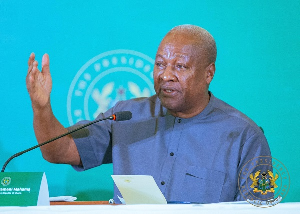Accra, March 17, GNA - About 2,000 professional graduate teachers, who completed their studies from universities on study leave without pay, are yet to be posted by the Ghana Education Service (GES) because of the ban on public sector employment which took effect from June, 2008.
The National President of the Ghana National Association of Teachers (GNAT), Mr Joseph Kwaku Adjei, said this at separate meetings with teachers during a visit to the Northern Region. A statement from GNAT in Accra on Tuesday said this "unfortunate situation" had destabilized many teachers in the country. National executive officers of the Association, together with some senior officers from the GNAT National Headquarters in Accra visited teachers in the region to know their problems and seek ways to solve them.
It was also to get new ideas to improve upon the Association's work at the National Secretariat.
Mr Adjei stated that 2,159 personnel of the GES, who had worked for over a year, were yet to be paid.
Calling for the lifting of the ban, the National President said:
"Teaching is the profession that makes all other professions possible. It is, therefore, not an exaggeration to say that the future is in the hands of teachers".
Mr Adjei called on the Government and other stakeholders to listen to the woes of the suffering teachers and do something positive about their plight.
On the Single Spine Salary Structure, he told the teachers that equal pay for work of equal value".
He said it was the expectation of GNAT that the new pay policy would ultimately lead to the enhancement of salaries for public sector workers.
Mr Adjei informed the teachers that organized labour had appealed to President John Evans Atta Mills to set in motion the finalization of the process leading to the full implementation of the Single Spine Salary Structure.
Turning to the unauthorized deductions from teachers' salaries, he decried the situation where last year, many teachers suffered such deductions crafted as "Tax on arrears" and "Social Security Tax Recovery", saying the Controller and Accountant General's Department had not been able to offer any meaningful explanation on those deductions. He also mentioned over deductions from the Teachers' Fund and the Credit Mall and gave the assurance that GNAT was in constant touch with the two institutions to refund such monies.
Mr. Adjei spoke about the 15 per cent salary arrears which were due some teachers in July and August, 2008; the 10 per cent salary arrears which should have been paid to some teachers who retired from the GES in 2007 as well as the arrears due some trained teachers who graduated from training colleges in 2007 and had been put on their salary scale. He called on the Government to endeavour to effect all such payments to serve as a motivation to the affected teachers.
The General Secretary of GNAT, Mrs Irene Duncan- Adanusa said the face of labour worldwide had changed from confrontation with Government to dialogue.
She said it was important that public sector workers in the country realized this in order to stop accusing labour unions of being in bed with the Government in power. The General Secretary reminded teachers that GNAT worked with any government in power in the true spirit of social partnership to play its part in achieving the nation's, more especially, in the area of education.
Mrs. Duncan-Adanusa said GNAT puts much premium on quality public education and the pursuit of that objective became the driving force behind most of the Association's activities. She briefed the teachers on the new National Pensions Act 766, expounding to them the transitional arrangements for those who are currently over 55 years of age.
She said CAP 30 would be phased out within the next four years, but the Controller and Accountant General's Department would continue to pay those who were employed under CAP 30.
The General Secretary expressed her gratitude to teachers in the region for working hard under very trying conditions to satisfy their clients, assuring them of GNAT's commitment to continue to play its role in ensuring improved working conditions for its members.
General News of Tuesday, 17 March 2009
Source: GNA












